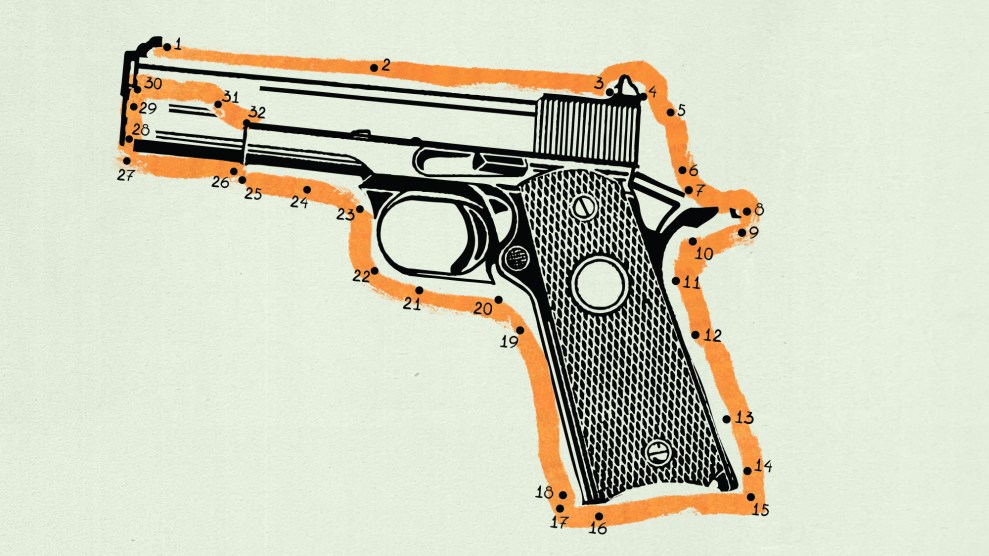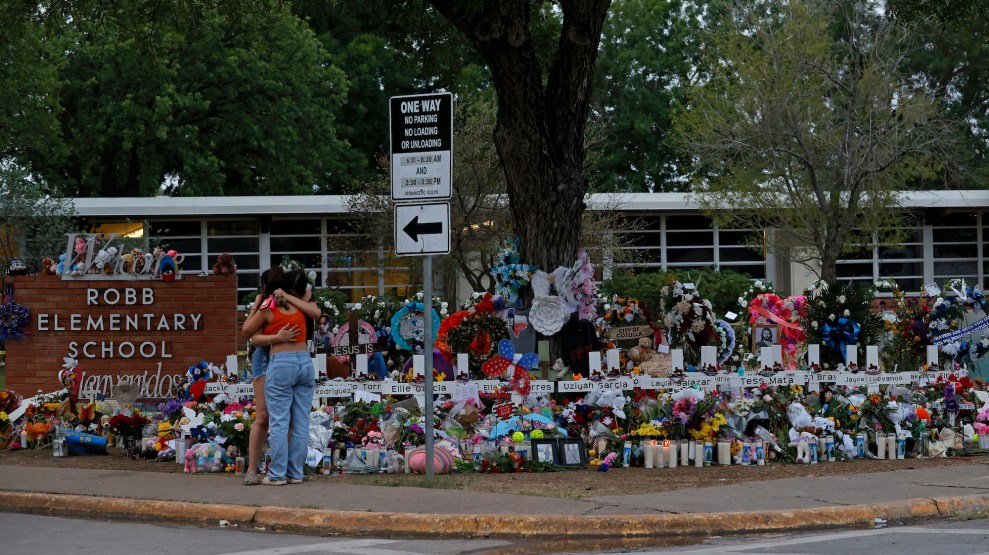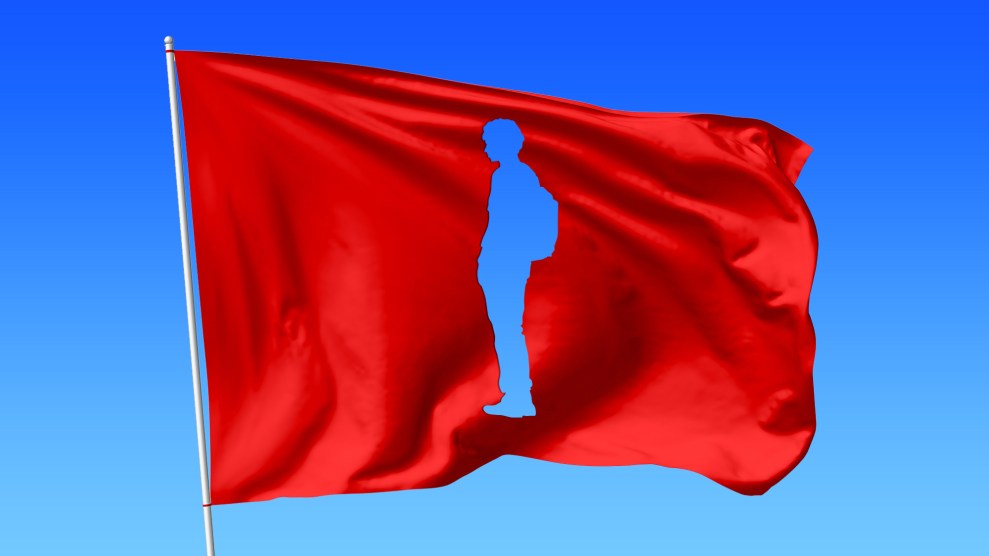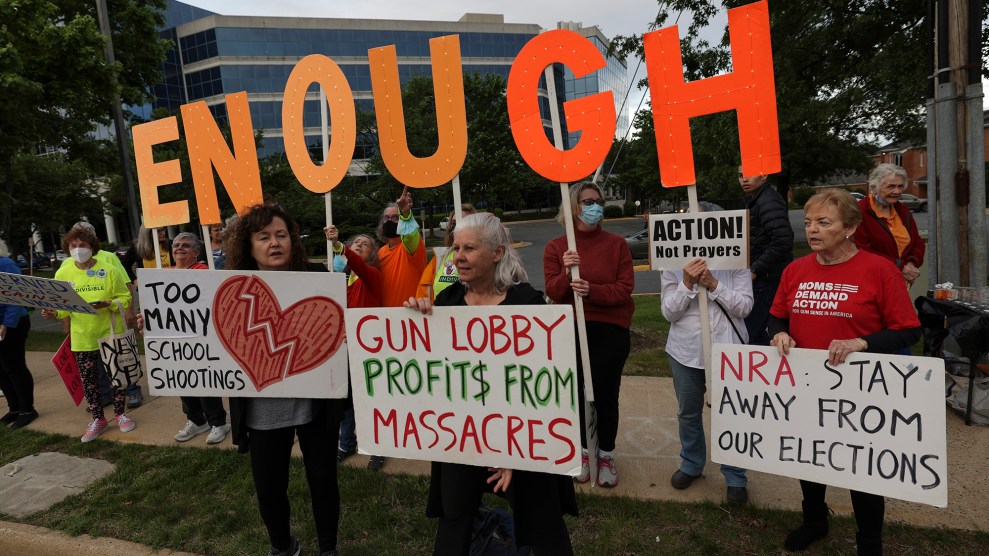
Grace Molteni/Mother Jones; Getty
An estimated 311,000 children in this country have experienced gun violence at school since the Columbine school shooting in 1999. A recent analysis reveals that in 2020, firearms surpassed cars to become the leading cause of death for people under 19 years old. And some of the country’s worst school shootings have devastated the country just over the last decade: Sandy Hook Elementary (2012), UC-Santa Barbara (2014), Marysville-Pilchuck High School (2014), Umpqua Community College (2015), Marjory Stoneman Douglas High (2018), Santa Fe High (2018), Oxford High (2021). And last month, Robb Elementary School in Uvalde, Texas.
Those statistics should shock you. There is nothing about school shootings that is “normal” or inevitable. But these attacks, and the news cycles following them, have become a sad, familiar part of our lives. (It’s not just school shootings; all mass shootings have increased in the last decade too, according to our database.) And over and over, parents and caregivers, including those on Mother Jones’ staff, have found themselves preparing to talk to their children about guns, death, and loss.
For parents that are looking for tip sheets, there are several expert-approved guides (like this one, from the Child Mind Institute, or from the National Child Traumatic Stress Network) to choose from. But those primers, of course, can’t cover all the questions parents have about discussing gun violence. For instance, some Mother Jones staff members wondered: What do you tell a kid when adults in their lives—police, politicians, or voters—fail them? How can a teen’s sense of agency to affect change help them process trauma? Another staff member shared with me that his child asked, what does it feel like to die?
While the tip sheets can certainly be useful, I wanted to go deeper and answer some of these hard questions. So I called Dr. Chandra Ghosh Ippen, a psychologist and the associate director of the Child Trauma Research Program at the University of California, San Francisco, who has authored several children’s books aimed at helping children process trauma. Below are some of the takeaways from our conversation, in her own words. Her responses have been edited and condensed for clarity.
On why it’s important to approach difficult conversations like a baseball catcher: First, try to have that difficult conversation yourself, with your friends and loved ones, so that you’re approaching the conversation from a place where you’ve metabolized it a little bit. So it’s not quite as raw. We [adults] can start by really thinking about our own emotional states, where we’re coming from, and getting the help and support that we need.
I use a lot of baseball metaphors when I do treatment. And I think a lot of times, grownups like to pitch. But when we’re in a situation like this, what we want to do is think of ourselves as catchers. And so we can say, “Hey, we’re here. Something hard has happened in our community, in our country, to people we care about, to small children”—whichever way you want to start it. And then, “We don’t know what you’ve heard. We don’t know how you’re feeling. But we’re here for you.”
And so that’s why it’s so important that you have, in a way, metabolized your own reactions. Because otherwise, we’re likely to bubble over with our own reactions and our own feelings and our own worries.
On how kids may rationalize death in unexpected ways: Especially working with young kids, what I’ve learned is that sometimes they have fears and worries and fantasies that grownups could never understand. I worked with a child once who said that he knew how the bad guys had killed his mom. And we didn’t know. And he said, they took her legs and put her in a bag. He was only four, and she died when he was three. And his grandma finally realized that what had happened—this took us months—was that he had gone to her funeral where there’d been a half-open casket. And being really little, he had thought that it was half-open because her legs were gone. That’s an example of fantasy. But you can see how disturbing it was for him to reflect on his mother’s death because he had that image in his mind. Another child that I’ve worked with, her father was killed in front of her. Paramedics came on site. She was two and a half at the time. And she didn’t know that what the paramedics were doing was helpful.
There are a lot of things that we as grownups understand that younger children don’t understand. And then there’s this mixture of fantasy that contributes to the horror of it. Because if you believe that the helpers aren’t helping, then you feel even less safe.
On how kids may bring up difficult topics when you least expect it: If something is very disturbing to children, they might not tell you right away. You might ask them a really heavy question, and they might really need to do something else. And that doesn’t mean that they didn’t hear you. It doesn’t mean that it’s not important. It just means that they need to come back to it when they’re ready. So when I talk about getting into the catcher position, it’s a longer-term position.
What we often see is at bedtime, at bath time, when they’re headed to school—that’s when kids might pop up with a question or a detail. It comes at the moments that we don’t expect it. Especially with younger kids, and even in teens, we see that they talk about it when their mind is reminded of something [stressful or traumatic].
On how children may carry trauma in the long term: I tell people that trauma is sort of like asthma. And so with asthma, you don’t get rid of it. You don’t cure it, you manage it. And so if you’ve had a traumatic experience, you can think about it like when you’re exposed to pollen: You’re going to have more symptoms, you’re going to have more questions. The pollen is the things that remind you of the danger. If you have a child with asthma, you may be pretty vigilant about pollen. So if you have a child who has either been affected by this tragedy or by other tragedies, you may want to be aware of, are there things that might be their “pollen”?
And then you can ask, “How can I make you feel safe?” Because their body is remembering danger. How can you help them to recognize that there’s nothing wrong with them? We can expect that people will have a reaction on the anniversary of an event like a shooting, or we can expect that people might have a reaction anytime they hear about the police not quite doing what we hoped that they would do. For the children who were in the school, it might be the sound of glass breaking. There will be lots of things that remind them and they might want to talk about it, or their bodies may not be functioning as well. We would want to understand that.
On what you might say to a kid who asks what death feels like: If we go into the catching position, we realize that this is a little one or a person with deep thoughts and deep fears. And so what we want to do is to lean into the conversation and to say, “You seem worried about this, tell me about it.” We want the child to share. “Have you been thinking about this and worrying about this?” And we might want to hear first, before we answer. And some kids really do want an answer. There, we might say, “We don’t know.” And maybe say, “But this is what we believe.” And that takes us back to our spiritual, religious beliefs.
What to say to a child whose trust in adults is broken: I think, again, we’re going to want to get into that catching position and listen to them about how angry they are. When you’re angry because somebody didn’t protect you, or you’re sad, it’s important for people to join with you in that, so that you don’t feel stranded in your anger or your sadness. So I might say, “I’m angry too.” And we want to actually acknowledge whenever there’s been a rupture [in trust].
But then, it has to go beyond that. It has to go from “yes, it happened, it was wrong” to “and this is what we’re doing to repair this harm and lack of protection.” Because if we don’t have this next step, then the acknowledgment feels a little bit hollow. It’s still better than having somebody say, “Oh, no, no, no. Everything was fine. They did everything they could.” That would feel very hollow. But what is the real action? What is it that we’re doing?
On how activism may help kids cope: There’s a concept [in the field of psychology] that an experience of danger, like a traumatic experience, robs you of your sense of competence and capacity. So when these things happen, you often feel stuck, you often feel hopeless. And so the idea of being able to do something, being able to use your voice, being able to transform the experience, is a big part of healing. And it’s important that that come from the inside—from the inside out—and it not be, So-and-so is doing this. Why am I not doing this?
On how attacks on people of color can add layers of pain for those communities: I think when you’re from the cultural group [affected by a shooting], and your group has not always been cared for or has been under threat from a variety of different groups, there’s a layering of pain. You have to deal with the horrible tragedy, and depending on the response from the larger community, you may be reminded that once again your group is in danger, once again your group is not being protected by or attended to by society. That makes it an even heavier burden.
For people who live in regions outside of where the event took place, some people might ask, “Why are you so affected by this? You’re all the way over there.” And you might say, “Well, it’s a reminder of the historical pattern.” As a collective trauma, it is painful in its own right, and it’s a reminder of hundreds of years of suffering.
Having fear without protection is a theme for many cultural groups. And, unfortunately, our society has been a big source of fear for too many groups. So, in this circumstance, if it feels as though society is not responding, not protecting these communities, that will greatly affect how people feel and how they will do in the long run. This is why what we do as fellow community members matters so much. We need to ensure that families are supported by society. We need to attend to the services they want and ensure they receive them. We need to advocate for funding to support them, and we need to ask ourselves whether they feel we have truly listened and made changes in response to what they went through. And it matters what we do in the long run; it matters that our support of these communities is not just as long as the news cycle.
How parents could translate that knowledge into conversations with children: As parents, we need to acknowledge that the pain that individuals and communities are feeling may go beyond this tragedy. A recent event can remind people of the past, of what they went through and of what their people went through, and of society’s lack of action. We need to help our children understand our collective past history, so they can begin to understand other people’s reactions with enduring compassion, and so we can think about how we help people and communities heal not only from this tragedy but from the wounds of the past.

















